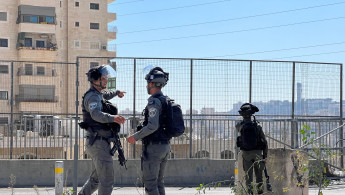Palestinians in Shuafat camp shave their heads in solidarity with Udai Tamimi
Dozens of young Palestinian men from Shuafat refugee camp, north of occupied Jerusalem, have resorted to shaving their entire hair to mislead Israeli forces who are looking for a Palestinian suspected of killing an Israeli soldier and wounding two others.
On 8 October, a young Palestinian man approached Israeli soldiers at the Shuafat checkpoint and opened fire at close range, killing 18-year-old Seargent Noa Lazar. Two other Israeli security personnel were injured.
Later, the Israeli authorities claimed that Udai Tamimi, a 21-year-old Palestinian, is the perpetrator of the attack based on reviewing cameras filming the site, as well as after arresting several of Tamimi's relatives.
The Israeli forces also imposed a six-day full closure on the camp of Shuafat under the pretext that Tamimi was hiding in the densely populated camp, home to more than a hundred thousand Palestinians. However, Israeli soldiers have yet to catch Tamimi.
Speaking to The New Arab, residents from the Shuafat camp said that Israeli forces are checking up on the identities of any men with shaved heads since Udai is known to have shaven his hair.
As a result of these measures, youths in the camp have responded by shaving their heads to mislead the Israeli forces and allow Tamimi to have more time to remain in hiding in the camp until he can escape from it as soon as possible.
To encourage others to do the same, several young men documented themselves shaving their heads and posting their videos on Facebook, Instagram and Twitter social media platforms.
الڤيديو من صفحة الحلاق بدون أي تعديل ، من شعفاط اليوم📍 pic.twitter.com/smXrIwGMvg
— 𓂆Adam (@Adam1652021) October 15, 2022
"We aim to mislead the Israeli forces and prevent them from arresting our iconic hero," Mohammed al-Khatib, a Shuafat camp-based young man, who was involved in this campaign said to The New Arab. "Even if Israel appears to the world as one of the strongest countries, we [Palestinians] can create new methods to resist the Israeli occupation."
"We do not know where Tamimi is hiding, but we will do our best to help him in our own ways,” Khatib added, stressing that "the Palestinian people have the full right to protect themselves and those who are wanted by the Israeli authorities."
For Palestinians who have been resisting Israel for decades, it was not the first time there have been campaigns to mislead Israel and prevent its forces from attacking or arresting the so-called wanted Palestinians, according to al-Khatib.
In 1936, mainly during the Palestinian popular revolution against British colonialism, young men wore Palestinian keffiyeh to mislead British soldiers and prevent them from arresting the revolutionaries.
Palestinians from the West Bank and Gaza Strip praised the initiative and considered it one of the most creative forms of resistance that "would exhaust the occupation soldiers and make their task more difficult in Shuafat camp."
"The Palestinians everywhere can do their best to defend their rights and protect their heroes from the Israeli violations," said Sari Jaradah, a Palestinian man based in Hebron, said to The New Arab. "All the time, we [the Palestinians] can prove that we have the full right to defend our land and people by various means."
"Neither Udai nor his supporters belong to a specific Palestinian faction, they belong to their Palestinian national identities," he added.
For his part, Khaled Safi, a young man based in Gaza, said to The New Arab that "as long as the Israeli occupation exists in our territories, our people have the right to confront the Israeli soldiers everywhere."
"Udai carried out a heroic operation as a response to the ongoing Israeli violations against our people (...) it is normal to support him by launching creative initiatives to protect him from the arresting or even from the Israeli assassination," the 35-year-old said.




 Follow the Middle East's top stories in English at The New Arab on Google News
Follow the Middle East's top stories in English at The New Arab on Google News


